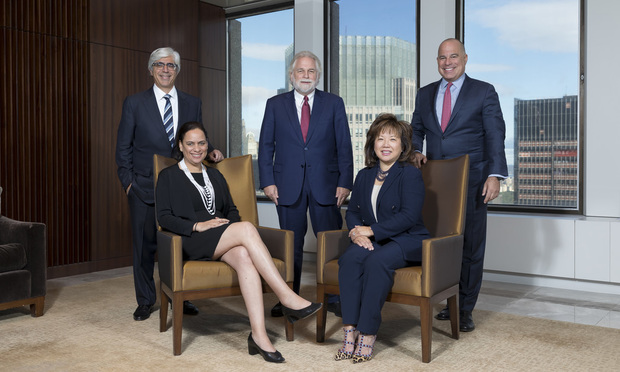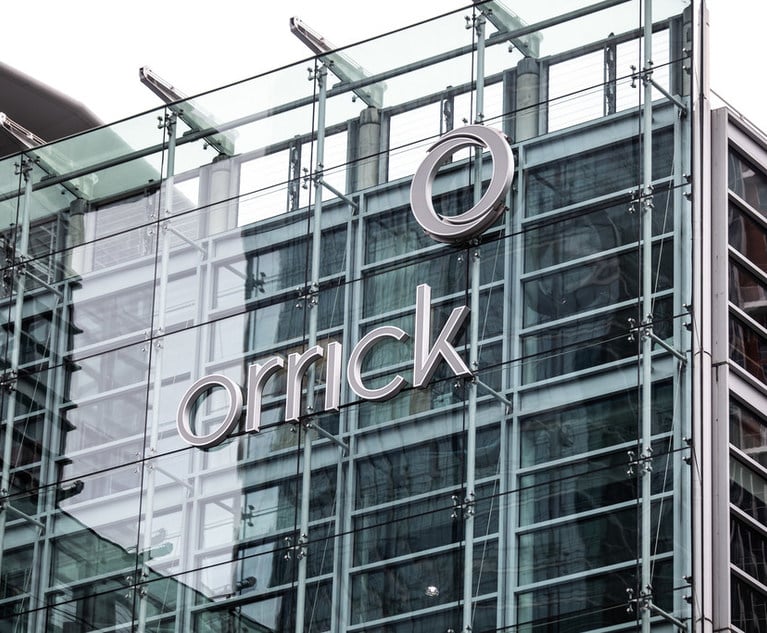Challenge Accepted: Gibson Dunn, Litigation Department of the Year Winner
When the stakes are highest and the spotlight is brightest, Gibson Dunn answers the call.
December 29, 2019 at 08:00 PM
6 minute read
 From left: Theodore J. Boutrous Jr., Mylan Denerstein, Randy Mastro, Debra Wong Yang and Orin Snyder.
From left: Theodore J. Boutrous Jr., Mylan Denerstein, Randy Mastro, Debra Wong Yang and Orin Snyder.
Even for a president who has made "fake news" a rallying cry, Donald Trump's Nov. 7, 2018, press conference was a contentious affair. But the bile he directed at his questioners—calling CNN's Jim Acosta a "terrible person" and attacking the media as "the enemy of the people"—was overshadowed when the White House revoked Acosta's press pass the same day, falsely claiming he had "placed his hands" on an intern.
As media organizations absorbed the implications for their businesses and for the nation, Gibson, Dunn & Crutcher's Theodore Boutrous and Theodore Olson were already leaping into action. Before the night was over, they had hashed out a strategy with CNN and assembled a team to counter the White House on First Amendment grounds.
The case was quintessential Gibson Dunn: high-profile, high-impact and high-stakes.
"There was concern that, if you lose, there will be a bad precedent," Boutrous recalls. "Our view was, well, if we don't file a suit, if we're not willing to defend the First Amendment, then who cares?"
The result was quintessential Gibson Dunn, too: a gigantic win, delivered under great pressure, with lasting import for an industry and for the country. Boutrous, Olson and partners Anne Champion and Joshua Lipshutz brought their suit, argued their case, and secured an order restoring Acosta's pass in just nine days. It was no surprise that when the White House this year pulled the credentials of another reporter, Playboy's Brian Karem, Boutrous got the assignment—and won again.
What's the firm's secret? The size of its litigation department doesn't hurt, with more than 200 partners and 500 associates accounting for more than half of the firm's head count and revenue. Gibson Dunn also has its superstars—Olson and Boutrous among them—at both the trial and appellate level, sprinkled across practices, time zones and (increasingly) national borders. And, of course, it wins cases for Fortune 50 clients facing enormous threats.
Partners: 208 Associates: 518 Other: 29. Department as Percentage of Firm: 56.8% Percentage of Firm Revenue: 54.7%
But other firms have hundreds of litigators, marquee advocates and lots of offices. And every firm among our finalists can point to impressive victories with important legal issues and vast sums in the balance. What sets Gibson Dunn apart is how many of its cases check all those boxes: mind-boggling financial stakes, major unsettled legal questions and a nexus to big, national issues—from the First Amendment to antitrust, data privacy, climate change, immigration, and the gig economy.
Take the firm's double-barreled victory over the U.S. Securities and Exchange Commission's in-house enforcement regime, which had long been challenged unsuccessfully on the grounds that the agency's administrative judges were unconstitutionally appointed.
In New York, litigation department co-chair Randy Mastro beat back an administrative action against client Lynn Tilton of hedge fund Patriarch Partners after being tapped to replace another firm just weeks from trial. "No one gave us any odds on winning that case, because the deck is stacked in those proceedings," Mastro says, noting that a challenge to the SEC before one if its own judges was considered nearly unwinnable. But Mastro did win, persuading an SEC judge to fully reject the agency's own $200 million case in September 2017.
An even bigger victory came nine months later in Washington, when partner Mark Perry persuaded a 6-3 U.S. Supreme Court majority to rule against the agency in Lucia v. SEC, a major separation-of-powers decision holding that SEC administrative law judges are "officers of the United States" subject to the Appointments Clause.
The opinion was not only a win for Gibson Dunn's client; it also tilted the balance of power away from the administrative state, with implications beyond the SEC. And it came on the heels of another successful agency challenge, when then-partner Eugene Scalia—now U.S. Secretary of Labor—persuaded the Fifth Circuit to strike down the Labor Department's fiduciary rule, hacking away massive regulatory obligations for the investment industry.
The SEC and Labor Department cases were just two of the key appellate wins that the firm secured. In a blockbuster decision in May 2018, Olson, a former U.S. solicitor general, persuaded the Supreme Court in Murphy v. NCAA to strike down a 1992 federal sports-betting ban, helping to reshape the economics of both professional athletics and online gambling. On the immigration front, Boutrous and partner Ethan Dettmer were part of the coalition that successfully challenged the White House's decision to rescind the Deferred Action for Childhood Arrivals program before the Ninth Circuit, paving the way for Olson to argue for the so-called Dreamers before the Supreme Court in November. (A decision is expected by the summer.)
The firm's trial court record was just as impressive. In the landmark AT&T-Time Warner merger case, Texas partners Robert Walters and Michael Raiff, representing AT&T, were part of the multifirm team that beat back the government's antitrust challenge. In the continuing fight over corporate responsibility for climate change, Boutrous helped persuade judges in New York and California to reject municipalities' theories of liability against Chevron and other oil companies.
Chevron is a longtime Gibson Dunn client, with a relationship cemented by Mastro's knack for fending off multibillion-dollar cases against the company over the years. But the firm has also made inroads with clients in younger industries. Those include Facebook, which is relying on Gibson Dunn in a tangle of privacy and data security cases, and gig economy companies. For Grubhub, partners Michele Maryott and Theane Evangelis scored a trial win in a bellwether employment case after trimming away class action claims, drawing a roadmap for other sharing economy defendants whose workers seek greater employment protections.
Cultivating technology clients was part of a determined strategy by the firm, says partner Debra Wong Yang, a former U.S. attorney in Los Angeles who co-founded Gibson Dunn's information technology and data privacy practice group nearly a decade ago—long before consumers' digital privacy or the classification of gig economy workers were priorities before the courts or on Capitol Hill.
"You could see where things were going," says Yang, whose Silicon Valley clients have included Uber. "So we got ourselves trained up. We got ourselves ready."
The firm's combination of discipline and savvy keeps clients coming back. CNN general counsel David Vigilante, who worked with Boutrous and Olson in the Acosta case, says he trusts Gibson Dunn lawyers to have the intellectual curiosity to come up with good ideas—and the skills to apply them.
"The biggest premium for me, other than are you smart and are you nice, is are you curious," Vigilante says. "Some people just crackle. They seem to attract lawyers like that."
This content has been archived. It is available through our partners, LexisNexis® and Bloomberg Law.
To view this content, please continue to their sites.
Not a Lexis Subscriber?
Subscribe Now
Not a Bloomberg Law Subscriber?
Subscribe Now
NOT FOR REPRINT
© 2025 ALM Global, LLC, All Rights Reserved. Request academic re-use from www.copyright.com. All other uses, submit a request to [email protected]. For more information visit Asset & Logo Licensing.
You Might Like
View All
Milbank’s Revenue and Profits Surge Following Demand Increases Across the Board
4 minute read
Fourth Quarter Growth in Demand and Worked Rates Coincided with Countercyclical Dip, New Report Indicates

Orrick Picks Up 13-Lawyer Tech, VC Group From Gunderson Dettmer

Saul Ewing Loses Two Partners to Fox Rothschild, Marking Four Fla. Partner Exits in Last 13 Months
3 minute readLaw Firms Mentioned
Trending Stories
- 1CFPB Labor Union Files Twin Lawsuits Seeking to Prevent Agency's Closure
- 2Crypto Crime Down, Hacks Up: Lawyers Warned of 2025 Security Shake-Up
- 3Atlanta Calling: National Law Firms Flock to a ‘Hotbed for Talented Lawyers’
- 4Privacy Suit Targets Education Department Over Disclosure of Student Financial Data to DOGE
- 5Colwell Law Group Founder Has Died in Skiing Accident
Who Got The Work
J. Brugh Lower of Gibbons has entered an appearance for industrial equipment supplier Devco Corporation in a pending trademark infringement lawsuit. The suit, accusing the defendant of selling knock-off Graco products, was filed Dec. 18 in New Jersey District Court by Rivkin Radler on behalf of Graco Inc. and Graco Minnesota. The case, assigned to U.S. District Judge Zahid N. Quraishi, is 3:24-cv-11294, Graco Inc. et al v. Devco Corporation.
Who Got The Work
Rebecca Maller-Stein and Kent A. Yalowitz of Arnold & Porter Kaye Scholer have entered their appearances for Hanaco Venture Capital and its executives, Lior Prosor and David Frankel, in a pending securities lawsuit. The action, filed on Dec. 24 in New York Southern District Court by Zell, Aron & Co. on behalf of Goldeneye Advisors, accuses the defendants of negligently and fraudulently managing the plaintiff's $1 million investment. The case, assigned to U.S. District Judge Vernon S. Broderick, is 1:24-cv-09918, Goldeneye Advisors, LLC v. Hanaco Venture Capital, Ltd. et al.
Who Got The Work
Attorneys from A&O Shearman has stepped in as defense counsel for Toronto-Dominion Bank and other defendants in a pending securities class action. The suit, filed Dec. 11 in New York Southern District Court by Bleichmar Fonti & Auld, accuses the defendants of concealing the bank's 'pervasive' deficiencies in regards to its compliance with the Bank Secrecy Act and the quality of its anti-money laundering controls. The case, assigned to U.S. District Judge Arun Subramanian, is 1:24-cv-09445, Gonzalez v. The Toronto-Dominion Bank et al.
Who Got The Work
Crown Castle International, a Pennsylvania company providing shared communications infrastructure, has turned to Luke D. Wolf of Gordon Rees Scully Mansukhani to fend off a pending breach-of-contract lawsuit. The court action, filed Nov. 25 in Michigan Eastern District Court by Hooper Hathaway PC on behalf of The Town Residences LLC, accuses Crown Castle of failing to transfer approximately $30,000 in utility payments from T-Mobile in breach of a roof-top lease and assignment agreement. The case, assigned to U.S. District Judge Susan K. Declercq, is 2:24-cv-13131, The Town Residences LLC v. T-Mobile US, Inc. et al.
Who Got The Work
Wilfred P. Coronato and Daniel M. Schwartz of McCarter & English have stepped in as defense counsel to Electrolux Home Products Inc. in a pending product liability lawsuit. The court action, filed Nov. 26 in New York Eastern District Court by Poulos Lopiccolo PC and Nagel Rice LLP on behalf of David Stern, alleges that the defendant's refrigerators’ drawers and shelving repeatedly break and fall apart within months after purchase. The case, assigned to U.S. District Judge Joan M. Azrack, is 2:24-cv-08204, Stern v. Electrolux Home Products, Inc.
Featured Firms
Law Offices of Gary Martin Hays & Associates, P.C.
(470) 294-1674
Law Offices of Mark E. Salomone
(857) 444-6468
Smith & Hassler
(713) 739-1250










